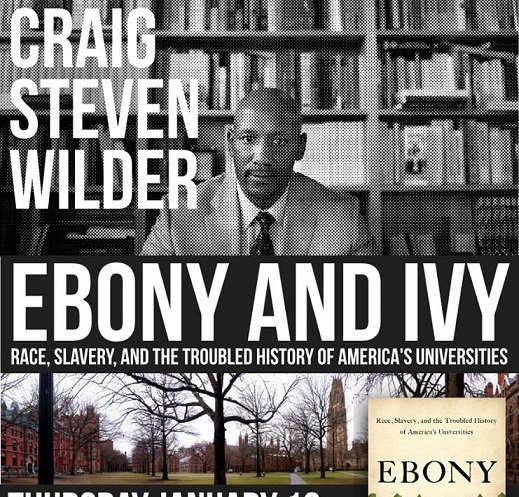
How African slavery shaped America’s oldest and elite colleges and universities
DEBASISH MITRA
[dropcap]W[/dropcap]hen the United States marked the 150th anniversary of the outbreak of the Civil War, Americans were naïve to believe that their forefathers’ “mighty moral struggle” completely erased the stains of slavery.
A century and half later those stains of America’s ugly past, kept hidden under the carpet so far, have resurfaced to haunt the nation. Many in the country are ashamed and so are we who live beyond its shores. James DeWolf Perry and Katrina Browne of Tracing Center on Histories and Legacies of Slavery feel South’s noble resistance and North’s moral crusade to end slavery were myths.
Slavery shaped America’s biggest pride — the foundations of its academic system. Almost all of America’s oldest and elite colleges and universities were built with the blood and sweat of the slaves who were brought in chains from Africa. In fact, bondage was the third pillar that stood beside the church and the state in building the superstructure of American civilization — its academic institutions.
September last year changed the world’s perception about America’s academia. Craig Steven Wilder, a professor of American history at Massachusetts Institute of Technology, published a startling book, Ebony & Ivy: Race, Slavery, and the Troubled History of America’s Universities, exposing the most uncomfortable truths about race, slavery, and the American academy.
Wilder’s book, a watershed publication, revealed many of America’s revered colleges and universities —from Harvard, Yale, and Princeton to Rutgers, Williams College, and UNC — were soaked in the sweat, the tears, and sometimes the blood of people of the color.
“Slave economy and higher education (in the United States) grew up together, each nurturing the other. Slavery funded colleges, built campuses, and paid the wages of professors. Enslaved Americans waited on faculty and students; academic leaders aggressively courted the support of slave owners and slave traders. Significantly, (America’s) leading universities, dependent on human bondage, became breeding grounds for the racist ideas that sustained them.”
Wilder’s book shook the core of my pride that my son is a doctoral student of one of the Ivy League universities in the United States. It changed my perceptions to the extent that I agree with what Library Journal felt when Ebony & Ivy: Race, Slavery, and the Troubled History of America’s Universities hit the book stores. Oh how deeply implicated American higher education has been in racial exploitation that has dispossessed and subjugated peoples of color so as to invest whites beyond measure.
We are now painfully reminded every moment that life in early Americas and foundations of the nation’s academia were neither idealistic nor idyllic. On the contrary, in its felony against humanity, America isn’t actually even a shade behind Europe’s colonial crimes. No explanations, no pettifogging, no excuses can really “sanitize the genocide and abduction of both native Americans and African populations during this period.”
At least nine earliest American colleges and institutions, including Harvard, Yale, Princeton, Brown, Rutgers, Williams, the University of North Carolina, were set up with active support, participation and funding from slave traders who were then the economic backbones and intellectual backers of an emerging new culture and civilization. These elite institutions today stand “as a silent monument to slavery.”
Wilder has churned the American society very deeply. Universities across the country are now researching their past and origin. Americans, academicians and common people alike, are debating feasibility of apologizing to improve equity in academia. Yet the disgraceful legacy seems to be stubbornly sticky.
The nation is increasingly finding it difficult to forget that an early flier for an event at King’s College — which later became Columbia University — included an advertisement for a slave auction. The advertisement on the flier read: “Two likely Negro boys, and a girl, to be sold. Inquire of William Griffith, opposite Beekman slip.” During those early ugly days Yale University conferred honorary degree to both a slave owner and to an abolitionist. This showed how confused and polarized contemporary American society was.
Wilder said that there were lots of people on campus who argued vehemently against the expansion of the slave trade and the expansion of slavery. But they were in minority and they “lost that battle in part because of the emerging intellectual defense of slavery that was rooted in racial science.”
Slavery not only founded the colleges and laid the cornerstones of America’s academic superstructure the universities endorsed and promoted the business of slavery making the relations between academia and slavery complimentary to each other. The institutions produced graduates to run and administer slave trade and bolstered the slave economy of the country.
We are not sure how cathartic is the revelation about US academic legacy to average Americans.
Because, there are still white supremacists in the country who feel that Wilder’s exposure is unwarranted and is aimed at tarnishing the nation. They feel his book reads more like a ‘Leftist grovelling.’
In negating history rather than in reconciling and apologizing these supremacists are denying the basic law of civilization and that fact that when civilizations are built upon slavery they always fail if its people cannot reconcile with the moral debt that they owe the enslaved. Mere emancipation is never enough.
The majority in the United States today owe the minorities a moral debt and in acknowledging this can perhaps America find its true emancipation and pride. It is time for the nation to take a step back and accept its history.–Courtesy Times of Oman
All opinions and views expressed in columns and blogs are those of individual writers and do not necessarily reflect the editorial policy of Caravan


